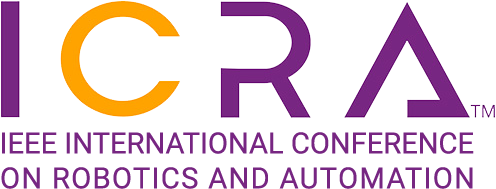About ICRA
Welcome to ICRA@40!
ICRA@40 is a celebration of 40 years of pioneering research and technological advancements in robotics and automation. As the flagship conference of the IEEE Robotics and Automation Society (RAS), ICRA brings together leading experts, researchers, and practitioners from around the world to discuss and explore the latest innovations in the field.
Our Mission
The mission of ICRA@40 is to advance the field of robotics and automation through the dissemination of cutting-edge research, fostering collaboration among academics, industry professionals, and policymakers, and promoting the exchange of innovative ideas. We aim to drive technological advancements that address global challenges and improve quality of life.
Our History
ICRA was first held in 1984 in Atlanta, Georgia, USA, and has since grown into the largest and most prestigious conference in robotics. Over the past four decades, ICRA has been the venue for numerous groundbreaking advancements and has played a pivotal role in shaping the field. From the early days of robotic manipulators to the latest AI-integrated systems, ICRA has showcased the evolution of robotics and its impact on society.
Key Milestones in ICRA’s History
1984: The inaugural ICRA conference is held in Atlanta, Georgia.
1995: First internationally hosted ICRA in Nagoya, Japan, marking the conference’s global expansion.
2000: Millennium Conference in San Francisco, highlighting significant advancements in mobile robotics and AI.
2020: ICRA goes virtual for the first time due to the COVID-19 pandemic, showcasing advancements in telepresence and remote operation technologies.
2023: The 40th edition of ICRA is held in London, UK. This milestone event celebrated four decades of pioneering research and innovation in robotics and automation, featuring record attendance and highlighting the latest advancements in AI, robotics, and autonomous systems, Keynotes included industry heavyweights such as plenary speakers Hugh Herr on bionic limbs or Jasia Reichardt on the “uncanny valley.”
*Page cover image depicts Marc Reibert whilst giving his plenary speech at ICRA 2023
2024: ICRA to be held in Yokohama, Japan, focusing on the theme “CONNECT+,” aiming to foster collaborations across diverse fields.
Notable Achievements
Robotic Manipulation: Early ICRA conferences laid the groundwork for advancements in robotic manipulators and control systems.
Human-Robot Interaction: Pioneering research in human-robot interaction, showcased in various ICRA editions, has significantly improved the integration of robots into daily life.
AI Integration: The integration of AI into robotics has been a recurring theme, with ICRA highlighting cutting-edge developments in machine learning, computer vision, and autonomous decision-making.
Collaborative Robots: Introduction and development of collaborative robots (cobots) designed to work alongside humans in industrial settings.
Future Goals
Looking ahead, ICRA aims to continue its role as a catalyst for innovation in robotics and automation. Our future goals include:
Expanding Global Collaboration: Enhancing partnerships and collaborations across the globe to drive the development and application of robotics technologies.
Addressing Societal Challenges: Focusing on the application of robotics to address critical societal issues such as healthcare, environmental sustainability, and disaster response.
Promoting Diversity and Inclusion: Encouraging greater diversity within the field of robotics by promoting participation from underrepresented groups and supporting inclusive research initiatives.
Advancing Ethical Standards: Leading discussions on the ethical implications of robotics and automation, ensuring that advancements are made responsibly and ethically.
Influential Figures and Keynote Speakers
ICRA has hosted numerous influential figures who have significantly contributed to the field of robotics and automation. Some notable keynote speakers from past conferences include:
Hugh Herr: Known for his pioneering work on bionic limbs, enhancing the interface between humans and machines.
Jasia Reichardt: Credited with coining the term “uncanny valley,” her contributions span robotics, arts, psychology, and ethics.
Marc Raibert: Founder of Boston Dynamics, renowned for his work on dynamic and agile robots like Spot and Atlas.
What People Are Saying
“ICRA has been instrumental in bringing together the brightest minds in robotics, facilitating groundbreaking research and collaboration.” – Dr. John Doe, Robotics Researcher
“Attending ICRA has been a game-changer for our startup, providing exposure to the latest innovations and networking opportunities with industry leaders.” – Jane Smith, CEO of Robotics Startup



